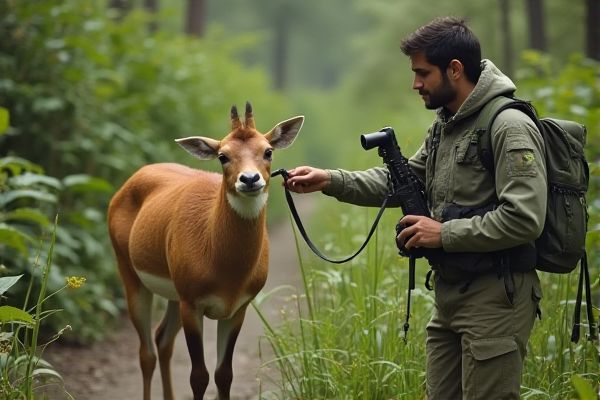
Wildlife biologists in India can find diverse job opportunities across various sectors, including government organizations, non-governmental organizations (NGOs), research institutions, and conservation agencies. Fieldwork, research, data analysis, and policy-making play significant roles in these positions, often requiring advanced degrees in biology or environmental science. Positions are available in wildlife sanctuaries, national parks, and ecological research projects focused on species conservation and habitat restoration. Networking within the ecological and environmental sectors, along with gaining experience through internships or volunteer work, can enhance job prospects significantly.
Job Description
Wildlife biologist jobs in India involve studying animal behavior, population dynamics, and habitat conservation to promote biodiversity. Professionals in this field often engage in field research, collect data, and collaborate with other scientists and organizations to implement conservation strategies. Your work may also include educating local communities about wildlife issues and participating in policy development related to environmental protection. Opportunities exist in various settings, including government agencies, non-profit organizations, and research institutions throughout the country.
Requirement
Wildlife biologist jobs in India typically require a bachelor's degree in biology, ecology, or a related field. Experience in field research, data collection, and species identification is crucial, often gained through internships or volunteer positions with conservation organizations. Understanding of local ecosystems, wildlife conservation laws, and environmental policies enhances job prospects. Skills in data analysis and proficiency with GIS software can significantly improve your competitiveness in the job market.
Salary and Perks Expected
Wildlife biologist jobs in India offer an average salary ranging from Rs3 lakh to Rs10 lakh per annum, depending on experience and expertise. Positions in government agencies or reputed organizations may provide additional benefits such as health insurance, retirement plans, and field allowances. Opportunities for research grants and project funding can enhance your overall compensation package. With a growing emphasis on conservation, particularly in national parks and protected areas, job prospects are promising for individuals passionate about wildlife and environmental studies.
Similar Job Names
- Wildlife Biologist
- Conservation Scientist
- Ecologist
- Wildlife Researcher
- Wildlife Consultant
- Field Biologist
- Wildlife Rehabilitation Specialist
- Conservation Officer
- Marine Biologist
- Biodiversity Manager
- Environmental Educator
- Wildlife Manager
- Habitat Restoration Specialist
- Environmental Scientist
- Protected Area Manager
Job Expectation Concept
Wildlife biologists in India are tasked with studying animal behaviors, populations, and habitats to ensure sustainable management of natural resources. You may work in diverse environments, ranging from forests and grasslands to wetlands, focusing on conservation efforts and ecological research. The role often involves fieldwork, data collection, and collaboration with government agencies and NGOs to develop wildlife management policies. Understanding local biodiversity and ecological dynamics is crucial for making informed decisions that support both conservation initiatives and community needs.
Career Advantage and Weakness
Wildlife biologist jobs in India offer a unique advantage by allowing you to contribute significantly to conservation efforts, protecting biodiversity, and studying various ecosystems. Opportunities exist within various sectors, including government organizations, NGOs, and research institutions, providing a diverse range of career paths. However, these positions often come with challenges, such as limited funding for research and the potential for remote fieldwork in difficult conditions. Balancing passion for wildlife and environmental issues with job stability can be a concern for many professionals in this field.
Important Thing Must Know
Wildlife biologist jobs in India offer opportunities to work in diverse ecosystems, from forests to wetlands and deserts. A strong educational background in biology or environmental science is typically required, with many positions seeking a master's degree or higher. Fieldwork is a significant part of the role, involving data collection on species, habitats, and environmental challenges. Collaborating with government agencies, NGOs, and research institutions enhances conservation efforts and policy development. As a wildlife biologist, you contribute to preserving India's rich biodiversity while gaining valuable hands-on experience in the field.
Alternative Career Options
Wildlife biologists in India can explore various alternative career options beyond traditional roles in research and conservation. Opportunities exist in wildlife tourism, where you can engage with eco-tourism initiatives that promote sustainable practices while educating the public about biodiversity. Environmental consultancy offers another avenue, allowing professionals to assess and mitigate impacts on wildlife habitats while working with corporations and government agencies. Teaching and mentoring in academic settings also provide fulfilling paths to inspire the next generation of conservationists and wildlife enthusiasts.
Companies List
- Wildlife Conservation Society India
- Wildlife Institute of India
- Forest Research Institute
- National Biodiversity Authority
- Wildlife Trust of India
- World Wide Fund for Nature India
- Centre for Wildlife Studies
- Environmental Research Institute
- Indian Institute of Forest Management
- Riverside Wildlife and Conservation Society
List of Ideal City
Bangalore offers a vibrant ecosystem with its proximity to forests and wildlife sanctuaries, making it an attractive location for wildlife biologists. Pune is renowned for its rich biodiversity and several research institutions dedicated to environmental studies, providing ample job opportunities. Jaipur, known for its unique desert ecosystem, also supports wildlife conservation projects that often seek skilled biologists. Finally, Dehradun, surrounded by the stunning Himalayas, is home to various wildlife research organizations and government agencies focused on biodiversity preservation.
 jobs-india.net
jobs-india.net